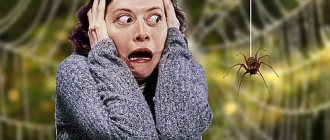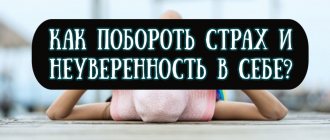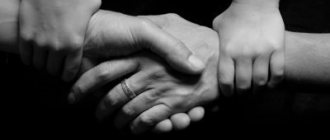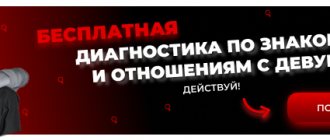Panic fear (PS) also occurs as a separate condition, but more often it comes along with phobias, neuroses and panic attacks. Panic fears and phobias are ambiguous concepts. As you know, fears are useful for humans and help the human species survive. These are rational fears. The purpose of such fears is to warn a person about danger.
What is panic fear, its differences from rational fears
Panic fears are irrational in nature. Panic fear is a strong emotion accompanied by panic, anxiety and restlessness. Its main feature is that such fear does not arise as a consequence of a dangerous situation, but without cause. But the reason why PS appears can be found. But this reason is irrational, like fear itself. Phobias are often the cause of panic fear.
Phobias are a condition of a person during which he experiences strong, unreasonable fear when he finds himself in specific situations. For example, claustrophobia. A person who suffers from claustrophobia experiences severe panic and horror when entering an elevator—panic fear. In such situations, the irrationality of this emotion can be traced. For example, a person on a train panics, but there is no reason: the train did not move off the rails; no accident occurred and there are no other dangers either. In this situation, there is no reason to panic. Therefore, phobias, like PS, are irrational symptoms.
The main causes of phobias: social and hereditary factors. Separately, it is worth highlighting the fears that a person acquired as a result of negative life experiences. Phobias cause panic fears.
About panic fear
This fear arises suddenly and unexpectedly, without any obvious or visible reasons. And therefore it becomes real stress, which is very difficult to cope with. A person is always afraid of everything inexplicable, and this feeling of fear remains in the memory for a long time.
Some people even experience a panic attack. In this case, the feeling of fear arises completely suddenly and has no apparent reason. It can be very difficult to cope with such an attack on your own. Under the influence of fear, the autonomic nervous system is activated. This is manifested by pallor of the skin, trembling, numbness of the hands, difficulty breathing, drying out of the mucous membranes in the mouth, upset stomach and other unpleasant symptoms.
In order to get rid of a state of panic, you need to calm down, breathe deeply and switch your attention. For example, drink tea, take a sedative, talk with a loved one. But the main thing is to try to understand that there is no threat to life and health.
Phraseologism “Panic fear” origin:
The phraseological unit “Panic fear” comes from the name of the Greek god Pan. This is the god of cattle breeding and shepherding, fertility and wildlife. Pan is considered the son of Hermes; there are several myths about his mother.
Pan was born with goat legs, horns and a long beard, and immediately upon birth began to jump and laugh. The child's mother, frightened by the unusual appearance and character of her son, fled in horror, but Hermes wrapped the baby in hare skins and took him to Olympus. Here the child amused all the Olympian gods, and especially Dionysus.
The god Pan lives in the shady forests of Arcadia. There he grazes his flocks, playing a sonorous pipe. When the hot afternoon comes, Pan, tired from his studies, falls asleep, and not a single shepherd dared to disturb his sleep by playing the pipe. Pan is quick-tempered; when he appears unexpectedly, he can frighten the traveler who disturbed him. He can also send such horror when a person rushes headlong to run, not making out the road. It happened that Pan inspired a similar fear in an entire army, and it turned into an uncontrollable flight.
This kind of fear, named after the god Pan, began to be called panic.
Phraseologism “Panic fear” meaning:
Panic fear, sudden panic. senseless, unaccountable, reckless and irresistible fear.
PANIC FEAR
PANIC FEAR
(from Pan). Sudden and causeless fear. The ancient Greek mob thought that the god Pan made his visits suddenly, at night, terrifying the people, hence the expression - panic fear.
Dictionary of foreign words included in the Russian language. - Chudinov A.N. , 1910.
PANIC FEAR
unaccountable, blind fear that instantly seizes the crowd for no apparent reason; according to ancient belief. Greeks, was sent to people by the god Pan, hence the name.
Dictionary of foreign words included in the Russian language. - Pavlenkov F., 1907.
PANIC FEAR
from Pan. Sudden, unfounded fear.
Explanation of 25,000 foreign words that have come into use in the Russian language, with the meaning of their roots. - Mikhelson A.D. , 1865.
See what “PANIC FEAR” is in other dictionaries:
- The expression is used in the meaning: unaccountable, sudden, strong fear, covering many people, causing confusion. Originated from the Greek myths about Pan, the god of forests and fields. According to myths, Pan brings sudden and unaccountable terror to... ... Dictionary of popular words and expressions
PANIC FEAR, panic w. Greek sudden. unaccountable, senseless, reckless and irresistible. Dahl's Explanatory Dictionary. IN AND. Dahl. 1863 1866 ... Dahl's Explanatory Dictionary
PANIC FEAR, female panic, Greek. sudden. unaccountable, senseless, reckless and irresistible. Dahl's Explanatory Dictionary. IN AND. Dahl. 1863 1866 ... Dahl's Explanatory Dictionary
Panic; unaccountable panic fear Wed. The laws that create and control panic are still unknown. She appears to you in the form of a maddened dog that has accidentally broken loose from its chain. Saltykov. Variegated letters. 9. Wed. I knew the old man: in his soul...
Panic fear
- wing. sl. The expression is used in the meaning: unaccountable, sudden, strong fear, covering many people, causing confusion. Originated from the Greek myths about Pan, the god of forests and fields. According to myths, Pan induces a sudden and unaccountable... ... Universal additional practical explanatory dictionary of I. Mostitsky
Unaccountable Wed. The laws that create and control panic are still unknown. She appears to you in the form of a maddened dog that has accidentally broken loose from its chain. Saltykov. Variegated letters. 9. Wed. I knew an old man: in his poor soul I settled... ... Michelson's Large Explanatory and Phraseological Dictionary
Panic (panic fear)
- (on behalf of the Greek god Pan, who was believed to be capable of causing sudden and strong fear) - extreme, uncontrollable fear that immediately seizes a person in some emergency circumstances. An image of this in “Queen Margot” by A. Dumas... ... Encyclopedic Dictionary of Psychology and Pedagogy
fear
- an emotion that arises in situations of threat to the biological or social existence of an individual and is aimed at the source of real or imagined danger. In contrast to pain and other types of suffering caused by the real action of dangerous... ... Great Psychological Encyclopedia
PANIC, panic, panic. 1. Imbued with panic. Panic horror. Panic fear. Panic mood. 2. Easily susceptible to panic, frightened (colloquial). Panic man. Ushakov's explanatory dictionary. D.N. Ushakov. 1935 1940 ... Ushakov's Explanatory Dictionary
1. FEAR1, fear (fear), husband. 1. units only A state of extreme anxiety and anxiety from fear, from threatening or expected danger, fear, horror. Feeling of fear. Panic fear. In mortal fear. Fear of the unknown. Fear of death... Ushakov's Explanatory Dictionary
Books
- Lecture “Gogol. “VIY” as a Russian erotic utopia”, Dmitry Bykov. “The problem of Russian literary criticism is that it still stubbornly considers Gogol a virgin. Meanwhile, the most powerful description of the act of love is, of course, the scene of flying on a panel...
A phraseological unit is a stable figurative expression, the meaning of which is not determined by the meaning of individual words. Phraseology includes:
- idioms – phraseological units as rethought figurative meanings;
- proverbs and sayings formed in folklore;
- catchphrases are phrases of an aphoristic nature relating to a specific author, artistic, literary or cinematic work.
Symptoms
Panic fear is the main manifestation of a panic attack. Other symptoms of panic fears and panic attacks:
- fear of death;
- fear and tightness;
- chest pain;
- cardiopalmus;
- shortness of breath, tachycardia;
- lump in the throat;
- lack of air;
- nausea;
- muscle tension and trembling;
- sweating and pallor;
- dizziness;
- abdominal cramps, nausea and even vomiting;
- noise in ears;
- severe anxiety;
- bad feelings;
- fear that panic may happen again anywhere or in similar situations.
Panic attacks, which require treatment, can develop into panic attacks over time. When a person constantly experiences panic fear, when he finds himself in certain situations, over time it can become a habit. A person will get used to experiencing panic fear in specific life circumstances. It’s difficult to get rid of any habits, especially panic fears that have turned into panic attacks. Although, panic attacks can occur before panic fears and even cause them.
Clinical picture
Manifestations of panic are different. Symptoms of a mental disorder may resemble a heart attack. It is worth noting that due to frequent fears and panic attacks, the functioning of the central nervous system is disrupted. A disorder accompanied by fear is characterized by a feeling of internal tension.
Such a state can be expressed as follows:
- Tachycardia and shortness of breath occur.
- Chills appear and the body may feel hot.
- Manifestations of the disease include tremors of the limbs.
- Due to impaired breathing function, suffocation is observed.
- Heart pain may occur.
- Attacks lead to diarrhea or constipation.
- Some patients experience abdominal pain.
- Possible urinary incontinence and frequent urination.
- A symptom of a panic attack is fainting, which occurs in severe cases.
- The condition is characterized by surges in blood pressure.
The symptoms of this disorder should not be ignored! A panic state leads to psychological disorders. A person gets lost in space and does not recognize friends or relatives.
One of the manifestations of the disease is depersonalization. This means that the patient does not want to be aware of what is happening to him. He tries to abstract himself from the attack, but his attempts are unsuccessful. Panic is accompanied by disorientation, in which the patient does not recognize his home or the houses around him. Some people experience fear of schizophrenia.
Stress and its consequences
The current age is full of noise, bustle, business - this puts pressure on the psyche of people, and some of them are not able to cope with it. Therefore, many people become familiar with a panic attack (PA) early. For some, panic occurs once. But sometimes panic recurs and then becomes a frequent occurrence. It becomes a habit to panic. PA is panic , uncontrollable fear, strong and causeless anxiety. During a panic attack, it is extremely difficult for a person to control himself. In such a state, a person is capable of falling into hysterics and screaming. This behavior appears inappropriate and often leads to injury. For example, someone is afraid to ride in cars. If panic occurs, this person is able to try to jump out of the car while it is moving.
PAs appear for various reasons. The current time is fertile ground for the development of this state: there is too much noise, information, demands and expectations. It is difficult for a person to cope with the amount of tension that covers him in waves day after day. Constant tension causes stress. When a person is exposed to stress for weeks, or even months, it can cause neurosis. Neurosis is often the main cause of PA and PS. To diagnose the presence of a panic attack, you need to become familiar with the main symptoms of this condition.
Causes
Prerequisites and causes of panic fears and attacks:
Prolonged stressful situation
For example, giving up your feelings. It often happens that a person considers the situation unfair and wants to speak out, but restrains himself, remains silent and “swallows” his emotion. But these emotions do not disappear anywhere, but remain in a person and accumulate. A person is in constant tension and stress.
Intrapersonal conflict
It occurs most often when duty and desires contradict each other. For example, after graduating from school, a boy wants to go to study as a journalist, but his parents insist on studying economics. The son agrees with his parents in order to be a good child and not upset mom and dad.
Now he is already a student, every day he goes to classes he hates, and, as before, he dreams of becoming a journalist. He understands that after training, his parents will want him to get a job as an economist. For a young man, this means never becoming what he dreams of. The boy sees only one way out - to enter into an alleged conflict with his parents in order to defend his desire and right to manage his life.
The problem is that he cannot do this because of his inner beliefs (which were raised by his parents) that he must always be a good and obedient boy in everything. According to this belief, to live by your principles, values and needs is to be a bad person and son. Therefore, the boy follows the path of least resistance - to do what is expected of him. The main danger is that such a boy will get used to using this model of behavior further in life. This will cause more and more internal conflicts, and this is a direct path to neurosis.
Benefit from illness
No matter how strange it may seem, panic fears can be beneficial. When too much is demanded from a person (most often by close people), but the person is not able to give it, for various reasons. Then suffering from panic attacks can be a kind of excuse for not taking any action.
Neurosis
It is neurosis that causes groundless panic, but the symptom must be treated first. As a last resort, you can carry out the work comprehensively - treat both panic fears and neurosis. It is very difficult to treat only the cause, since panic fears will interfere with adequately perceiving reality and the task will become much more difficult.
At-risk groups
The most susceptible to PA and PS are:
- Melancholic people. Their psyche is quite weak and susceptible to negative situations. Therefore, melancholic people are the first at risk.
- People with a strong sense of responsibility. Such individuals most often do not know how and cannot relax, so they remain tense for a long time.
- Holders of bad habits, as well as people leading a sedentary lifestyle.
- People living for a long time in greenhouse conditions. This lifestyle can make a person sensitive to the slightest stress. People who live busy lives are more resistant to stress, as they have to deal with it regularly. Therefore, a kind of immunity to stressful situations arises.
People who are at risk need to take preventive measures:
- Oxygen. Take long walks more often to breathe fresh air.
- Adrenalin. Exercise moderately, play active games, travel, communicate.
- Healthy lifestyle.
- Develop individual ways to deal with stress.
- Listen to calm relaxing music.
- Be at peace with yourself so that intrapersonal conflicts arise less often.
Most people suffering from this disease prefer to treat panic attacks on their own. This can be done. The main thing to remember is that before self-medicating, you should take certain measures: get examined in a hospital and rule out false symptoms of panic attacks. First of all, it is necessary to do an examination and check the functioning of the thyroid gland and brain, as well as the functioning of the adrenal glands and the state of the cardiovascular system. If the test results show that there are no problems, then we can talk about a disease such as PA and begin treatment.
My own psychologist
When a person is overcome by panic, there is no point in calling an ambulance. There are ways to quickly relieve panic attacks.
Ways to quickly relieve a panic attack:
- Breathing exercises. When a person is overcome by fear, you need to start slowly inhaling and exhaling air.
- Muscle relaxation. You need to tense your muscles, for example your arms, then relax them. You need to repeat several times until it becomes easier. This exercise is done to shift the focus of attention and distract from the surging panic.
- Visualization. Turn on your imagination and imagine some beautiful and calm place where it would be nice to relax, unwind, enjoy nature, peace and quiet.
- Affirmations (self-hypnosis). For example, repeat mentally or out loud the following phrases: “I may be nervous, but I can handle this situation”; “These are just my thoughts, but in reality everything is fine”; “These sensations are safe for me,” etc. It is better to combine breathing exercises and affirmations.
The methods described above will help cope with a panic attack, but temporarily. To get rid of panic fears forever, you need comprehensive work on yourself.
Treatment of panic fears
Here are the most effective ways to help eliminate panic fears and attacks.
Awareness
It is necessary to realize why it is beneficial to have panic fears. For example, what a person does not want to do or wants, for example, to rest more. Panic fears help to accomplish this, being a kind of justification for one’s actions or lack thereof. Panic fears not only take a lot from a person, but can also give something that a person needs, but cannot get it directly.
For example, a girl with a melancholic type of temperament wants to sit at home, read books and work remotely. Her hobbies are also quite calm - visiting performances and exhibitions. The girl’s parents want her to be active and energetic: she travels a lot, communicates, and strives to take a prestigious position. But the girl doesn't need that. But due to her soft nature, she is not able to refuse her parents directly. Therefore, she develops neurosis, and then panic fears, which become an excuse for her inaction. Thanks to her illness, the girl is unable to live the life that is imposed on her. She's sick.
Important! A person suffering from PA needs to recognize the personal benefits of this condition.
Medicines
A person suffering from panic attacks should always carry medication that blocks panic attacks. These include: Validol, Corvalol, Glycised, infusions of motherwort and valerian. But you shouldn’t get carried away with medications. Medicines are needed not so much for the purpose of using them, but for the sake of peace of mind. A person will endure a panic attack much easier if he knows that he has an emergency remedy at hand. It should be used only if all other methods have failed.
Understanding the Cause of Fear
It is necessary to understand what exactly fear is at the moment when it manifests itself. What exactly is a person afraid of: suffocating, dying, seeming stupid, etc. You need to understand your basic fears in order to know what you have to deal with and what you have to work on.
Inclusion in frightening situations
This is psychologically difficult to do. For example, a person is afraid of flying on airplanes. This means that a person must get on a plane and fly. Perhaps PA will occur, or the person will experience severe discomfort. Such actions are necessary, as this will help cure obsessive fears once and for all. PA is a habit that has been developed for a specific action or situation. For example, a person is afraid of being in a crowd. Therefore, every time he finds himself in a crowd, the chance to experience PA again will increase. Therefore, you need to develop a new habit for these situations.
Keeping a Feelings Journal
This practical exercise will allow you to better understand your feelings and desires, as well as live a conscious life. It is advisable to take a situation that caused fear or discomfort. You need to describe in detail your thoughts, sensations and feelings that arose under those circumstances. This practice will help you get to know yourself better, your motives, values, needs, etc. Keeping a diary like this is especially useful for people suffering from neurosis.
Meditations
Panic attacks are fear of a situation that does not exist at the moment. This is one’s own fantasy, which a person himself strengthens with his negative thoughts and brings to the point of absurdity. Therefore, it is very important to be aware, to return to the present moment. Mindfulness can be learned through meditation, for example, as presented in this video:
Panic fears must be treated, as their consequences are very dangerous.
How to get rid of panic fear
The roots of fear go to our unconscious. Therefore, it is unrealistic to independently understand the origins of nikophobia. To do this, you need to contact an experienced psychoanalyst. But some people, for one reason or another, try to get rid of panic fear themselves.
The first thing you can do is change your lifestyle so as not to encounter frightening phenomena or objects. If you are afraid of elevators, the logical thing to do would be to buy an apartment on the ground floor and look for a job where you can get to the office by stairs. This is a means to get rid of attacks of fear, but this method does not eliminate the cause itself. Fear will continue to live in you in a hidden form. It can be caused by discomfort that has no connection with fear. For example, problems with relationships with loved ones can cause a phobia of closed spaces.
Technique for putting off worry
You need to mentally accept your fears, state the fact that you have them. Next, you should check when exactly the excitement begins. You determine for yourself exactly when you start thinking about fear, that is, you allocate a certain amount of time to thinking about your phobia and living through it. This practice must be repeated every day. There will be no immediate result; the effect can come over several months and even years. Every day, 2 times for 10 minutes, you need to plunge headlong into thoughts about your panic fear. Positive thoughts should not be allowed into your head.
You can say out loud what is going on in your head, but not touch on the point of the meaninglessness of fears. After the time allotted for reflection has passed, you need to take a deep breath, with which you imagine that you are releasing and sending your fear far away. After that, you can do other things.
This is the so-called paradoxical technique, that is, we deliberately call on our phobias. We must mentally maximize the negative. This leads a person into a state of severe emotional discomfort. We must think that danger really threatens us, there is reason for fear. This state must be maintained for the 10 minutes that we have allocated for practice.
The body can only worry for a certain time. After a certain period of time, anxiety and fear themselves will begin to minimize. Emotions undergo changes during this practice. Anxiety will gradually give way to boredom. The stress system will no longer react sharply to irritating factors. This practice can be done not alone, but with someone who will listen to you during these 10 minutes. It is better for it to be a specialist. He should ask you to talk about fear, going into detail. That is, he should fix your attention on the negative, and not try to encourage or distract. We remember that the strength of this method lies precisely in its paradoxical influence.
After 10 days of regular practice, you should feel at least a minimal effect. Fears seem to “grow old.” If panic fear manifests itself in you on its own, at an unplanned time, let it play out to its fullest. But before that, try to mentally defer anxiety for at least a couple of seconds, so that fear appears as if on order.
Recording panic fears
Take a pen and paper and write down your fears throughout the day. Start writing at the moment when the attack of fear overtook you, and finish when it stops. You need to write down what images are born in your head, what emotions you experience in connection with this. Even if fear manifested itself in a similar form, we still record everything again.
This way you materialize your fear. Re-reading your notes later, you will see how unreasonable the panic was. You may become irritated by the need to take notes. This will turn fear into an obligation that causes boredom rather than a desire to run and hide.
Singing out fear
You need to sing about the thoughts that bother you. If you see a spider and begin to feel a twinge of fear, sing: “What a scary spider! I'm afraid that now he will climb on me! Singing tunes the body to a wave that is completely opposite to stress. For such songs, it is better to choose short phrases that relate to the main points of fear. Choose any motive. You need to hum for at least 3 minutes until the fears begin to subside.
Changing the image
If fears are not words, but images, pictures in the head, in such cases this practice is relevant. Change the image to another one, completely opposite to the scary picture. For example, if you are afraid that a doctor will physically harm you, imagine that he cured you with a minimum of procedures and you experienced no pain at all. Another variation of this method is to close your eyes, imagine your phobia as a cloud and let it fly away with the wind, out of your line of sight. It may be another image, not a cloud. Choose what helps you.
After any of the techniques described above have worked, it is worth using breathing practices for some time. This increases your chances of finally getting rid of painful panic fears. Also, after you have received the result, it is a good idea to occupy yourself with something that requires maximum activity. For example, throw yourself into work, caring for children, taking care of your body.
Audio recordings of fears
If you can put your panic fears into words, it's worth recording them on a voice recorder. This can be as short as a 10-second track or as long as a 5-minute track, depending on your ability to express what you feel and experience. Don’t think about the meaning and nature of your sensations, just dictate them. And you don’t have to buy a voice recorder for this. Recording devices are found in every mobile phone and smartphone today.
Listen to the resulting recording for 45 minutes a day or longer. While listening, you must artificially revive emotions, sensations and images in your head and body. You must be stressed. After a week of continuous practice, you will record the result. It may be small, but it is still worth continuing the practice. This way you get used to your fears, so the impact of the phobia activator factor will no longer be so strong.
Consequences of panic fears
The most likely consequences of PS:
- There will be more and more phobias.
- Panic fears can cause physical harm to both the patient himself and those around him. For example, if a person driving a car panics.
- Frequent panics can aggravate chronic diseases.
- Frequent, severe and uncontrolled PA can cause suicide.
- A person can become practically a hermit, but not because of an ideological worldview, but because of his fears. This is fraught with loss of work and family.
There are many ways to get rid of panic attacks on your own, and it is better to use them comprehensively, for at least three months. If a person feels that it will be difficult to cope with panic fears himself, then it is worth contacting a specialist who specializes in helping people suffering from panic fears, phobias and anxieties.
Self-help for a panic attack
It is possible to overcome an attack on your own if symptoms occur using the following two techniques:
- “square” breathing - shallow breathing in a moment of panic is replaced by breathing in this way, as a result of which the level of carbon dioxide in the blood decreases and relaxation occurs;
- “breathing control” – inhale for 5 seconds, hold your breath for 2 seconds, exhale for 10 seconds.
When doing the “breath control” exercise, you need to close your eyes and imagine yourself as a balloon. Do this several times, achieving complete relaxation at the end of each exercise.
Square breathing method
It is necessary and possible to fight fears, phobias and panic attacks. From the many techniques for overcoming fears, you need to, with the help of a specialist, choose the one that is most suitable for each individual.











